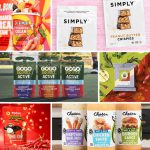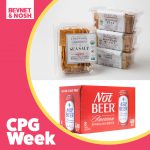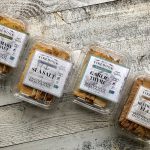7 Food Companies That Celebrate Earth Day Every Day

Companies and consumers alike will be taking a closer look at their food footprint this Saturday.
Earth Day is observed each year on April 22 to raise awareness about climate issues spanning from technology and energy to agriculture and food. It’s the largest civic observance in the world with more than 1 billion people participating in Earth Day events each year, according to the Earth Day Network.
But food brands and retailers have extra motivation to participate in these events. Besides protecting their supply chain, there’s some serious green in going green. More than half of consumers now say they are environmentally conscious and are more apt to purchase products that align with that mission, according to Forrester Research.
But for some companies, one day a year isn’t enough. These seven brands — like others in the industry — exemplify what Earth Day is about the other 364, too.
Alter Eco
Alter Eco, an organic and fair trade chocolate and grains company, is sweet on its sustainable packaging. The Certified B Corp company is working to create 100 percent compostable packaging across all its lines.
“The impact of our packaging is just as important as the product itself,” Edouard Rollet, Co-founder and Co-CEO, told NOSH. “How could we call ourselves a responsible, sustainable company if our packaging is going to landfills to live for hundreds of years?”
Currently, the company’s organic heirloom quinoa is enclosed in Gone4Good compostable pouches, while its chocolate bars are wrapped in recyclable paper and its truffles in compostable wrappers made of eucalyptus and birch.
“We feel a great sense of responsibility to set an example for creating the change we want to see in the world,” Rollet said. “Food is such a necessary component to everyday life, and by making foods that are not only good for you but good for the planet, we have the opportunity to set an example for other businesses to follow suit.”
Chosen
Chosen is fueling their dedication to sustainability with avocados. Literally.
Chosen Foods is the largest purveyor of naturally refined avocado oil in the world, processing over 350 million avocados per year. All those avocados leave the avocado oil mayo and propellant-free cooking spray maker with a lot of extra pits and peels. Chosen uses these “waste” products as biomass fuel to power their Mexico-based processing plant.
By utilizing food waste in a productive way, the company said it has been able to reduce its energy consumption by 7,425 Gigacalories — the approximate amount of energy required to power 1,200 US homes for an entire year.
“It was very important from both an economic standpoint and an environmental standpoint that we were not wasting those resources,” Natalie Morse, Director of Marketing and Product Development, told NOSH. “It’s important for all companies to be thinking about our future energy resources and what sustainable, clean alternatives we can consider today.”
Chosen Foods’ Avocado Oil bottles are also sustainable, made with glass from recycled Chilean wine bottles and the company is working to achieve its B Corp certification.
Love the Wild
Frozen fish meal kit Love the Wild is adding to the climate conversation from a viewpoint of responsible aquaculture.
After gaining investment earlier this year, the brand shifted to using 100 percent farm-raised fish in its kits. Co-founder and CEO Jacqueline Claudia told NOSH the company believes that underwater vertical farms where the company can “grow a lot of food in very little space” makes these fish a more environmentally-friendly protein.
“The vast majority of seafood available to US consumers is sustainable and gentler on the planet than other animal protein sources,” Claudia said. “Replacing food from land with food from the ocean at least once or twice a week is a way that consumers can make a meaningful impact on climate change.”
The brand is also focusing on educational efforts. Actor and environmental activist Leonardo DiCaprio, who joined the team as an investor and advisory board member, is sharing the company’s story to a larger audience. Claudia is looking to do the same by speaking at the Earth Optimism Summit at the Smithsonian on Earth Day.
Natural Grocers
Natural Grocers, which has almost 170 stores in 19 states, is committed to sustainability through store design and practices.
In 2009, the chain did away with plastic and paper bags. Since then, National Grocers has added other eco-friendly practices including composting, recycling and using non-toxic cleaning and sanitizing products.The company is also incorporating sustainability into its store designs. Locations are outfitted with domestic water heat reclaim, low water toilets, sustainable non-toxic construction materials, low-watt recirculating fans and LED lighting.
“We go to great lengths to find products that truly embody our principles and resonate with what’s important to our customers,” Kemper Isely, Natural Grocers’ Co-President said in a statement.
Organic Valley
Organic Valley, the world’s largest independent cooperative of organic farmers, is working to reduce its carbon hoofprint.
According to the brand, organic dairy farms with well-maintained pastures are have a smaller carbon footprint than conventional grain-based dairy farms and produce fewer CO2 per unit of dry matter than corn grain.
But Organic Valley wants to go further in its efforts.The company aligned itself with the Climate Collaborative, an industry wide initiative of natural food companies to reverse climate change, providing both staff in advisory roles and funding support. The brand has also made commitments to energy efficiency, 100 percent renewable power, carbon farming and engaging in climate policy as part of its goal to reduce company emissions to zero by the end of 2020.
“Our number 1 priority is to help reverse climate change,” Jonathan Reinbold, Sustainability, Research and Grant Manager for Organic Valley, told NOSH. “We are pursuing a carbon positive supply chain. Essentially we want to sequester more carbon on our farms than our total emissions then help other companies do the same.”
Regrained
Beer can be good for the planet– at least according to Regrained, an upcycled bar company that uses spent grains from breweries to make food products.
“Waste is too often accepted as a necessary ‘cost of doing business,’” Vice President of Product Philip Saneski told NOSH. “The fact is that waste can only exist if markets operate inefficiently or fail to emerge entirely. Our brand’s our mission is to create a market that will eliminate waste.”
Saneski added that Regrained has been involved in research with the USDA to scale the concept of “beer flour” and is also focusing on improving its 100 percent backyard compostable packaging as well as achieving its B Corp certification.
UrthBox
Urthbox is hungry to increase both consumers awareness and accessibility to healthy snacks.
The monthly subscription service promotes the importance of healthy and sustainable food by providing consumers gluten-free, vegan or special diet snacking samples from companies they may not have access to otherwise.
“As world citizens, we are up against some life-changing ethical and environmental global challenges involving food sourcing and manufacturing,” Ben Behrouzi, CEO of UrthBox said. “It’s one of the reasons why we believe it’s so important to not only make GMO-free and ethically-sourced food products more readily available in today’s marketplace, but to also help accelerate consumer awareness in an effort to drive greater change in the food and beverage industry.”
To further celebrate Earth Day, the company gave out 5,000 free snack boxes to earth-conscious fans throughout the month and donated what would have been the sales of those boxes to environmental non-profits.












